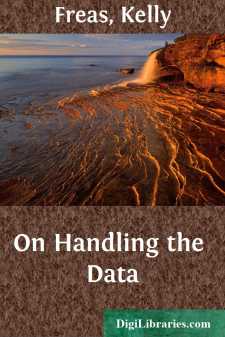Categories
- Antiques & Collectibles 13
- Architecture 36
- Art 48
- Bibles 22
- Biography & Autobiography 813
- Body, Mind & Spirit 142
- Business & Economics 28
- Children's Books 15
- Children's Fiction 12
- Computers 4
- Cooking 94
- Crafts & Hobbies 4
- Drama 346
- Education 46
- Family & Relationships 57
- Fiction 11828
- Games 19
- Gardening 17
- Health & Fitness 34
- History 1377
- House & Home 1
- Humor 147
- Juvenile Fiction 1873
- Juvenile Nonfiction 202
- Language Arts & Disciplines 88
- Law 16
- Literary Collections 686
- Literary Criticism 179
- Mathematics 13
- Medical 41
- Music 40
- Nature 179
- Non-Classifiable 1768
- Performing Arts 7
- Periodicals 1453
- Philosophy 64
- Photography 2
- Poetry 896
- Political Science 203
- Psychology 42
- Reference 154
- Religion 513
- Science 126
- Self-Help 84
- Social Science 81
- Sports & Recreation 34
- Study Aids 3
- Technology & Engineering 59
- Transportation 23
- Travel 463
- True Crime 29
On Handling the Data
by: Kelly Freas
Categories:
Description:
Excerpt
Dr. Robert Von Engen, Editor
Journal of the National Academy of Sciences,
Constitution Avenue, N. W.,
Washington, D. C.
Dear Sir:
I am taking the liberty of writing you this letter since I read your published volume, “Logical Control: The Computer vs. Brain” (Silliman Memorial Lecture Series, 1957), with the hope that you can perhaps offer me some advice and also publish this letter in the editorial section. Your mathematical viewpoint on the analysis between computing machines and the living human brain, especially the conclusion that the brain operates in part digitally and in part analogically, using its own statistical language involving selection, conditional transfer orders, branching, and control sequence points, et cetera, makes me feel that only you can offer me some information with logical arithmetic depth.
The questions raised in this letter are designed principally to reach the embryonic and juvenile scientists … the scientists-elect, so to speak. (I think the “mature scientists” are irretrievably lost.) For many reasons, some of which will be explained in the following paragraphs, I think that it is of the greatest importance that some stimulatable audience be reached. As yet, the beginners have no rigid scientific biases and thus may have sufficient curiosity and flexibility about the world in which they live to approach experimentation with a mind devoid of “the hierarchy of memory registers which have programmed in erroneous data.”
What I have to say will not surprise nor shock you, or those who are at present engaged in scientific investigation. In fact, I have read many science-fiction stories that deal with the same problem. Perhaps that is the only way that it can be approached, through the medium of a story? Yet why not present it for what it may be? Let me tell it my own way, and then, please, let me have your coldly logical opinion.
As to my background, I am a graduate student in the Zoology Department of a midwestern university working toward a Master’s degree, or actually a doctorate—we can bypass the M.S. if we choose—in the field of Cellular Physiology. My sponsor is an internationally known man in the field. The area of research that I have selected is concerned with the effects of physical and chemical agents on the synthesis of nucleic acids of the cell. Obviously, this is a big field, and I hope to select from among the different agents, one or two that will give “positive results.” I have been doing active research for about half a year testing the different agents. As for the fundamental questions raised, I am positive that it would make no difference in what field of science I were to work.
By now I have had enough course work to realize that when performing any assigned laboratory exercise—they should not be called experiments—even of a cook-book type, little or even major discrepancies arise, and always on the initial trials, no matter how carefully one works! As you are probably aware, the teaching assistant in charge of the lab or the instructor, generally runs through the exercise before the class does in order to get the “bugs” out of it—I am deliberately generalizing, since the above holds for all of the laboratory sciences—so when the student gets confusing or rather contradictory results, the instructor can deftly point out the error in the setup or calculations, or what have you....






















